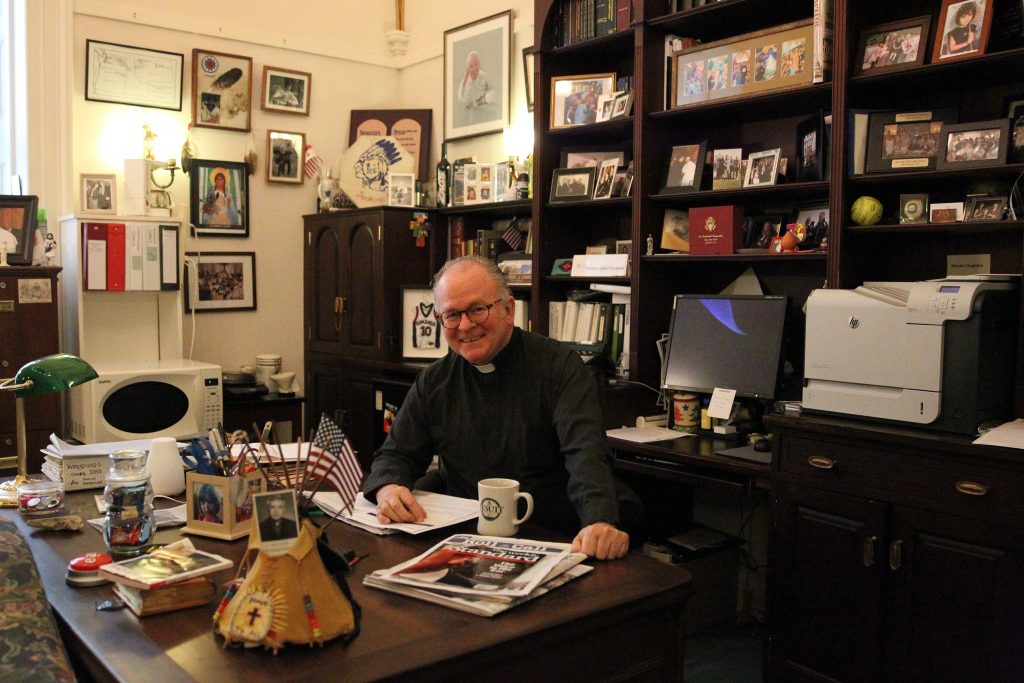The politics of prayer or, why the speaker fired the House chaplain — and then reinstated him
Almost three years ago, Pope Francis stood before a joint session of the U.S. Congress and reminded lawmakers that the chief aim of political life is “the tireless and demanding pursuit of the common good.”
House Speaker John Boehner, a Catholic Republican, stood next to Vice President Joseph Biden, a Catholic Democrat, as the Holy Father spoke about Catholic social teaching, particularly the duty to maintain religious liberty, care for the poor, and serve migrants and refugees.
And at a time when Capitol Hill seemed in the grip of partisan divisions, he spoke about the need to form “a community which sacrifices particular interests in order to share, in justice and peace, its goods, its interests, its social life.”
A day later, Boehner announced his resignation. He had achieved his dream of bringing the Holy Father to address Congress.
This April 11, Boehner’s reluctant successor and fellow Catholic, House Speaker Paul Ryan, also announced he would retire from Congress. Two days later, Ryan attempted to force the House chaplain, Father Patrick Conroy, SJ, to resign his post halfway through his term — a move that struck some lawmakers on Capitol Hill as brash and unusual.
After the ensuing uproar, Father Conroy withdrew his resignation, and Speaker Ryan reinstated him on May 8.
But questions still remain: Why would the House speaker, a Catholic, take an unprecedented step of removing a chaplain — and a Catholic priest no less — before his term expired in January?
“Religious faith is important to members of Congress,” Matthew Green, a politics professor at The Catholic University of America and author of “The Speaker of the House: A Study of Leadership” (Yale, $32), told Angelus News.
Green said Congress has a sizable number of Catholics in both parties, and the body is sensitive to charges of anti-Catholic bias.
The “peculiar” timing, lack of consistent explanations and subsequent backtracking, he said, was an “unforced error” that showed poor House management on Ryan’s part. The speaker could have sat down with the chaplain and made a case that, come January, it would be a good time for them both to move on.
Father Conroy was appointed by Boehner to serve as House chaplain in 2011 — the second Catholic priest and first Jesuit to fill the post since it began. After congressional Republicans and Democrats demanded to know why the Jesuit priest had been asked to resign, Ryan alleged some members of Congress had complained about the priest’s pastoral services.
But many Democrats and Republicans pushed back against the notion that Father Conroy was a partisan priest, affirming he was overall well-liked in the corridors of Congress.
In a letter to Ryan rescinding his resignation, Father Conroy stated he had never received complaints, nor had an opportunity to remedy any alleged deficiencies in his pastoral care. Ryan, for his part, had not raised them in person or by letter.
When he asked if there was “cause” for his removal, Father Conroy said Ryan’s chief of staff Jonathan Burks only mentioned a prayer Father Conroy delivered in November before debate began on the tax bill, and an interview he gave in the National Journal Daily.
According to Father Conroy, Burks dismissively told him, “Maybe it’s time that we had a chaplain that wasn’t a Catholic.”
Burks denied Father Conroy’s recollection of the account — but the matter was inflamed with speculation that some members of Ryan’s caucus had a problem with Catholics, when Rep. Mark Walker, R-N.C., indicated the search committee was looking for “somebody who has a little age, that has adult children, that kind of can connect with the bulk of the body here.”
The criteria would exclude celibate priests and nuns, and led to speculation the GOP wanted an Evangelical pastor in the role.
The speaker and the House chaplain met for coffee on May 8, and discussed how to move forward. Ryan said he feels “good about where things are” with Father Conroy, and that he was concerned just about pastoral services. Father Conroy said he had a good conversation with Ryan, and still has no information on his alleged pastoral deficiencies.
But analysts believe politics, not pastoral care, is the more likely culprit behind the failed attempt to remove the House’s second Catholic chaplain.
Green said if the November prayer were a factor in Father Conroy’s removal, it would be “disturbing” because there was nothing partisan in it.
In it, Father Conroy prayed that the efforts of Congress “guarantee that there are not winners and losers under new tax laws, but benefits balanced and shared by all Americans.”
Afterward, Ryan supposedly told Father Conroy to “stay out of politics.”
Stephen Schneck, former director of the Institute for Policy Research & Catholic Studies at The Catholic University of America, told Angelus News that Speaker Ryan is likely seeking to avoid a repeat of the prolonged leadership fight with the House Freedom Caucus that ensued after Boehner gave up the gavel.
“This decision needs to be understood in terms of the change of leadership in the House,” he said.
Ryan is trying to cobble together support for Rep. Kevin McCarthy, R.-Calif., the Republican majority leader, to succeed him. Some members of the GOP’s Freedom Caucus have long opposed McCarthy, a Baptist, and have made clear to Ryan that their loyalty to McCarthy will be contingent upon Ryan’s leadership performance between now and November.
Schneck did not think the request to remove Father Conroy originated from Ryan, but he may have agreed to it as a deal for certain Republicans to vote McCarthy as Ryan’s successor.
Eliminating the Jesuit priest might have also been timed with the upcoming midterm election cycle in mind, during which the 2017 GOP tax bill signed by President Trump is expected to be a campaign issue.
Ryan is trying to shepherd a farm bill through Congress that increases work requirements for food stamp recipients and threatens to cancel food support for able-bodied people who cannot verify proof of employment on a monthly basis.
Ryan has argued the reform will help people not be dependent on government. In the strange bedfellows of politics, Ryan is being opposed by other conservatives who object to having wealthy agro-businesses become dependent on government subsidies.
But regardless of how the House chaplain’s job fits in the game of politics, the events of the last few weeks are a sign of the times.
As John Carr, director of the Initiative on Catholic Social Thought and Public Life at Georgetown University, told Angelus News, the politicking on all sides over Father Conroy was “unfortunate in every way.”
“This is one more example of the dysfunction in Washington and the polarization of everything.”
Peter Jesserer Smith is a staff writer at the National Catholic Register, and a frequent contributor to Angelus News.
Interested in more? Subscribe to Angelus News to get daily articles sent to your inbox.

